Former President Donald Trump has announced a bold plan to create a government efficiency commission, naming billionaire entrepreneur Elon Musk as its potential leader. This proposal, unveiled during Trump’s recent speech at the New York Economic Club, has sparked both interest and controversy.
The commission’s stated goal is to conduct a comprehensive audit of the federal government, with the aim of eliminating fraud and improper payments within six months. Trump’s choice of Musk, known for his leadership of companies like Tesla, SpaceX, and X (formerly Twitter), signals a desire to bring a business-oriented approach to government operations.
Musk, responding to the announcement on X, expressed his willingness to serve, stating, “I look forward to serving America if the opportunity arises. No pay, no title, no recognition is needed.” This aligns with Trump’s narrative of bringing successful business leaders into government roles to increase efficiency.
However, Musk’s potential appointment raises significant concerns about conflicts of interest. As the CEO of multiple companies operating in heavily regulated industries such as automotive, aerospace, and social media, Musk’s role in shaping government policy could directly impact his own business interests. Critics argue that this could lead to recommendations that favor his companies or industries.
The proposed commission is reminiscent of past efforts, such as the Grace Commission established by President Ronald Reagan in the 1980s. While such initiatives aim to streamline government operations, their effectiveness and ability to implement significant changes have been debated.
Supporters of the plan, including financier John Paulson, praise Musk’s business acumen and potential to increase government efficiency. However, union leaders like Everett Kelley, president of the American Federation of Government Employees, express concern that the commission could be used to undermine the nonpartisan civil service.
The selection of Musk also reflects Trump’s strategy of aligning himself with high-profile business figures. This move could appeal to voters who value private sector experience in government leadership. However, it may also fuel criticism from those who worry about the increasing influence of billionaires in policy-making.
As the 2024 election approaches, the proposed efficiency commission and Musk’s potential role in it are likely to become key talking points. The plan highlights the stark differences between Trump’s business-centric approach to government and the more traditional policy proposals of his Democratic opponents. Voters will need to weigh the potential benefits of private sector efficiency against concerns about conflicts of interest and the appropriate role of business leaders in shaping government policy.



